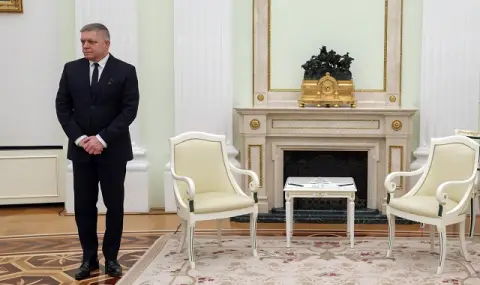No matter how the current gas dispute with Ukraine ends, one thing is clear: Slovakia is not threatened by an energy crisis, but is faced with the question of the political future of the country's pro-Russian Prime Minister Robert Fico.
While Russia continues to bomb Ukraine every day, the fate of Ukrainians is increasingly becoming a bargaining chip in the politics of some European countries. In Hungary, Viktor Orbán is deceiving his people that he is a "peace fighter" who opposes the "warmongers in Brussels". In Germany, Olaf Scholz is also trying to present himself as a "peace chancellor" in order to secure some of the votes that would go to the pro-Russian parties "Alternative for Germany" and "Sarah Wagenknecht Union” before the elections.
The Ukrainian issue has also been causing tremors in Slovak politics for some time. Prime Minister Robert Fico has now created a serious diplomatic conflict with Ukraine over the suspension of Russian gas transit through the country. The right-wing populist is threatening to stop electricity transmission to Ukraine and to deprive Ukrainian refugees in Slovakia of aid. However, this is hardly related only to the potential energy crisis in the country. In fact, it is a matter of distracting attention from domestic political problems - new drastic savings and disagreements in the ruling coalition.
Fico's cabinet, composed of representatives of three parties, has maintained pro-Russian positions since coming to power. However, until now the Slovak prime minister has supported the EU's policy on Ukraine. The change began in October - Fico gave an interview to Russian propagandist Olga Skabeeva, who openly says that Putin should attack Europe with nuclear weapons. In the interview, Fico accused the EU of "spreading war" in Ukraine and promised to visit Moscow for "Victory Day" - May 9, 2025, when the 80th anniversary of the end of World War II will be marked.
A neutral mediator?
In fact, Fico traveled to Moscow back in December 2024. The meeting was under the pretext of trying to resolve the energy crisis in Slovakia. Ukraine has long announced that it will stop the transit of Russian gas through its territory from the beginning of 2025, when the contract with Russia expires.
After Christmas, Fico announced that he had offered Vladimir Putin Slovakia to take on the role of a neutral mediator for peace negotiations between Moscow and Kiev. At the same time, the Slovak prime minister threatened Ukraine that he would stop supplying electricity to the country, and the Slovak defense minister recommended that Ukraine “give up its territories”.
A second front against Ukraine?
These statements caused shock and anger in Kiev. Ukrainian President Volodymyr Zelensky accused Robert Fico of ”opening a second energy front” against Ukraine on Putin's orders. The opposition in Slovakia and representatives of some other European countries have also sharply criticized the Slovak prime minister.
Robert Fico was actually one of the more moderate representatives of his party regarding Russia. The current change in course is probably related to the many economic and political challenges that Slovakia is facing. The country has one of the highest budget deficits in the eurozone - about six percent for 2024. Russian gas brought Bratislava a lot of revenue, including transit fees to other European countries.
Fico's government, which came to power with promises of social benefits, imposed severe austerity and raised taxes to compensate for the budget deficit. As of January 1, VAT rose from 20 to 23 percent. Large companies will have to pay a higher corporate tax. Financial assistance for families and pensioners was also reduced.
The question of Robert Fico's political future
At the same time, Slovakia will probably have to raise energy prices, as it will have to import gas from Western countries and in turn pay transit fees. Although it has long been known that Ukraine will stop gas transit through its territory, Bratislava did not think about any long-term solutions, as happened, for example, in the Czech Republic. Fico now blames Ukraine and the EU for sanctions against Russia that are worsening Slovakia's economic problems - similar to the narrative his counterpart Viktor Orban is promoting in Hungary.
There is another reason why the Ukraine issue is most likely being used as a distraction - Fico's coalition has been in a crisis for months, which is only getting worse. In October 2024, a smaller pro-Russian and nationalist group left the smallest coalition partner - the Slovak National Party. Since then, the government has had a majority in parliament of only one vote. In the other parties in the coalition, there are also MPs who believe that Fico's pro-Russian course is too radical and threaten to break the majority. Therefore, the scenario of early elections is already on the table.
It is not clear how the gas dispute with Ukraine will end and whether the Slovak leader will continue to threaten Kiev. One thing is certain - Slovakia is not facing an energy crisis, but the question of Robert Fico's political future.
